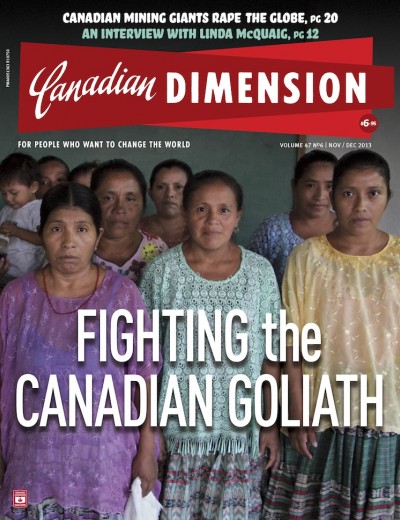Volume 47, Issue 6: November/December 2013

This is CD’s third special issue on mining in just the last few years ( the others were Jan/Feb 2011 and May/June 2013. Canada, one of the world’s largest mining nations, operates in more than 100 countries and is among the top five world producers of potash, uranium, nickel, gold, platinum, aluminum, diamonds and steel-making coal. The focus this issue is on the many ways the Canadian state supports the mining industry at home and abroad. Just before this issue went to press the Harper government announced it is readying a campaign to help mining companies expand their exploration and extraction activities around the world. According to government sources, assistance will include signing investor protection deals with foreign countries and pushing consulates and embassies to promote Canadian mining projects.
In this issue, CD is pleased to feature powerful images from the lens of Latin America-based photographer James Rodríguez, who has documented the brutal abuses of Canadian mining companies in the region for many years, and the continued brave resistance of indigenous communities. Several of his photos appear in the focus section and on the magazine’s cover. Rodríguez’s work can be seen at MiMundo.org and via Flickr.
Jen Moore focuses on how the Concervative government is directing taxpayer dollars to NGOs to develop corporate social responsibility programs for billion-dollar companies such as Barrick Gold, meanwhile cutting funds from organizations critical of the Canadian government’s aggressive promotion of extractive industries.
Two hundred thousand Guatemalans were murdered during a civil war that ended in 1996. This spring, for the first time in the Americas, the domestic court system and national legislation were used to try former state officials for war crimes. While covering this story in a CD exclusive, “Genocide on Trial”, Dawn Paley and Sandra Cuffe, look at the question the Canadian media has carefully ignored: could Guatemala’s trial open new possibilities for indigenous peoples to seek justice in Canada?
Arij Riahi and Tim McSorley write that the fact that so many indigenous communities in Canada live downstream of a polluting industrial project goes beyond pure coincidence. It’s “environmental racism,” as they were told by Aamjiwnaang First Nation and youth campaigner Vanessa Gray.
Judith Marshall, in “Contesting BIg Mining’s Power,” gives the most extensive analysis we have seen of the Harper government’s efforts on behalf of this country’s multinational mining behemoths—including advising Latin American governments on how to frame mining laws and policies.
“What Liberia is to shipping companies, Canada is for mining companies,” writes Theresa Wolfwood in her review of Alain Deneault and William Sacher’s Imperial Canada Inc.: Legal Haven of Choice for the World’s Mining Industries. “We offer the flag of convenience to mining companies which flock here to enjoy our lax and generous mining regulations.”
Also in this issue
Twelve-step programs are renowned for their ability to bring communities of sufferers of addictions and compulsive disorders together in a climate of support and respect, and through the steps, to empower sufferers to create personal change for a healthier life. Drawing on this model, Joyce Green and Michael Burton propose that Canadians adopt their Twelve-Step Program for a Post-Colonial Future, marked by the reinvigoration of Indigenous sovereignties, fused with elements of the settler state’s structure and processes.
When Linda McQuaig, well-known author and Toronto Star columnist, announced that she is vying to be the New Democratic Party candidate in the Toronto Centre by-election, CD contacted her for an interview. The interview, by CD editors Cy Gonick and Andrea Levy, was conducted by phone
You may have heard that long-time CD collective member Saul Landau passed away in September after a long illness. Saul was fully engaged in the work of the CD collective and a frequent commentator on CD’s radio program, Alert. His close friend, Lev Gonick, pays tribute to Saul’s life and work.
André Frappier with the Québec CD Editors take on the Québec Charter of Values, Sean Carleton unpacks the politics and what can be learned from the Science fiction flick Elysium, while David P Ball reviews Peter Kulchyski’s Aboriginal Rights are Not Human Rights (Arbeiter Ring, 2013).
More than 75% of our operating budget comes to us in the form of donations from our readers. These donations help to pay our bills, and honorariums for some of our writers, photographers and graphic artists. Our supporters are part of everything we do.
Donate Now